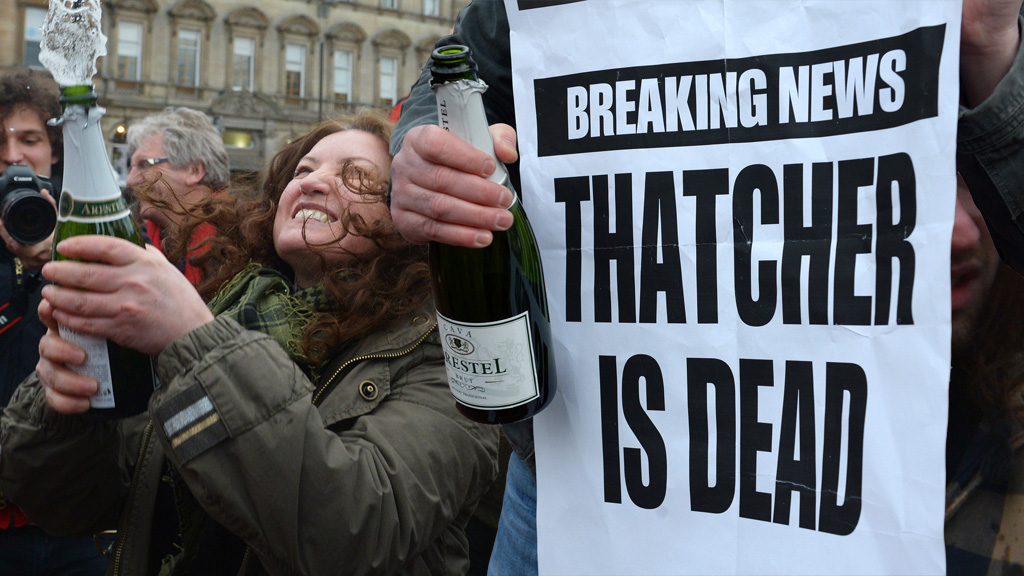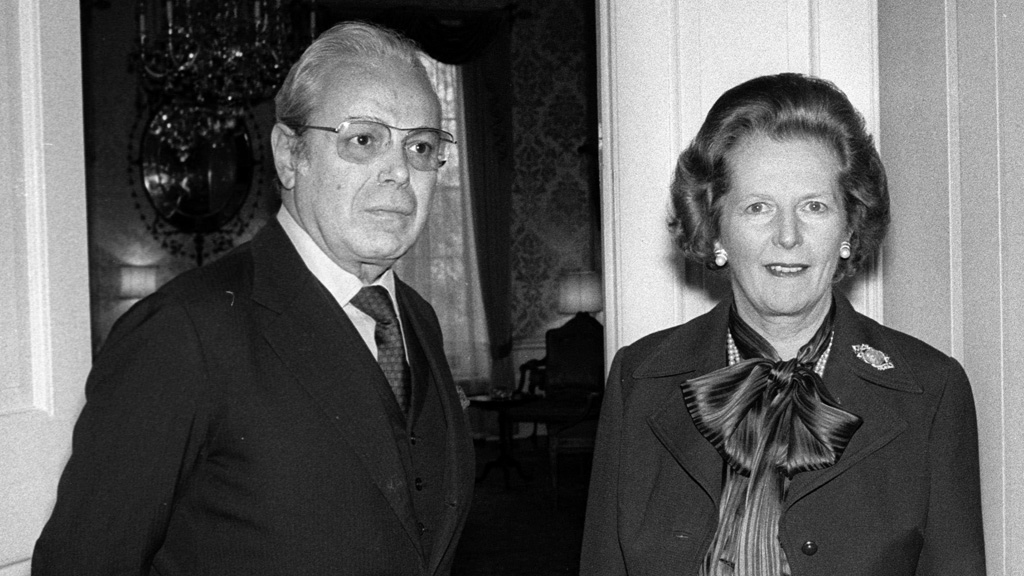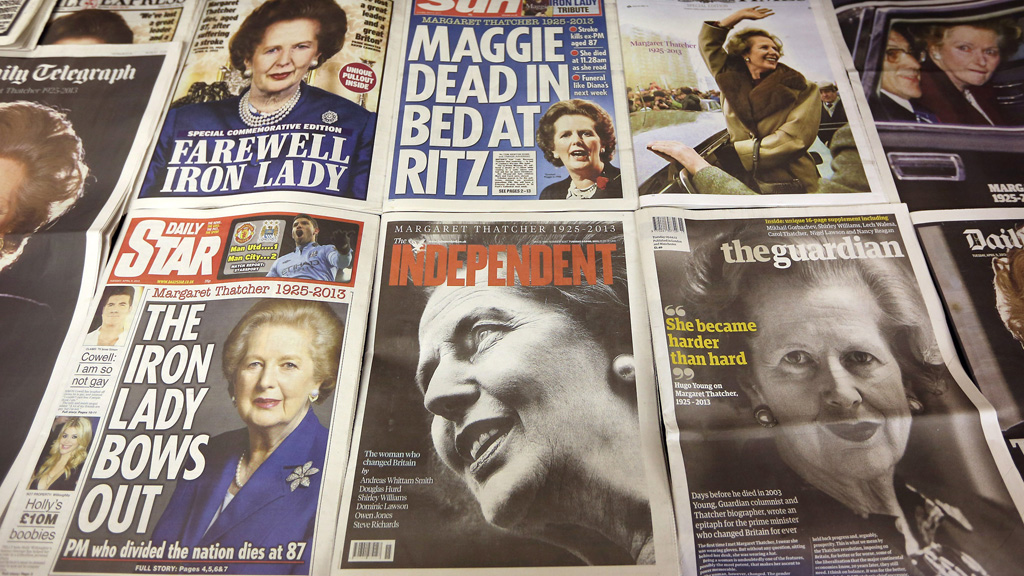Tributes and rejoicing follow Thatcher’s death
As foreign leaders send tributes to Margaret Thatcher, who died on Monday following a stroke, there are celebrations in Brixton and Glasgow by those who continue to oppose the “Iron Lady”.

A crowd of 300 gathered in Glasgow’s George Square, where protests against the introduction of the poll tax took place in 1989, to toast the departure of Britain’s first female prime minister.
Despite Glasgow council trying to discourage people attending the event, which was organised via social media, a crowd gathered, with members wearing party hats, drinking champagne and launching streamers into the air.
Anti-capitalist campaigners shouted “Maggie, Maggie, Maggie” from loudspeakers, to which the crowd responded “dead, dead, dead”.
In Brixton, south London, the scene of fierce riots in 1981, around 150 gathered to celebrate her death. A group scaled the area’s Ritzy cinema to change the lettering on a move advertising board to “Margaret Thatchers dead – lol”.
Jon Snow blogs: Why, in death, Margaret Thatcher finally knew her limits
As in Glasgow, champagne was drunk and party hats worn, with one banner reading “Rejoice, Thatcher is dead”.
Extra police were sent to Brixton in response to the crowd. Police reported “low-level” disorder, but there were no arrests and no serious injuries.
Pictures of anti-Thatcher graffiti scrawled on walls in Brixton also appeared on Twitter, with one reading: “You snatched my milk and our hope”, and there were reports of windows being smashed and shops looted.
Six police officers were injured when a scuffle broke out at a party in Bristol. Police were called to Chelsea Road in the Easton area of the city during the early hours of today where 200 people had gathered.
Chief Inspector Mark Jackson said the crowd had refused to disperse, and “bottles and cans were thrown at officers”. One officer remains in hospital and one person was arrested for violent disorder.
Brixton ‘party’ graffiti #Thatcher #thatcher twitter.com/PaisleyRainbelâ?¦
— Paisley(@PaisleyRainbell) April 8, 2013
In Easington, home of one of the collieries at the centre of the miners’ strikes, residents said they would not “shed a tear” at Baroness Thatcher’s passing.
Alan Cummings of Durham Miners’ Association said: “A lot of people hated the woman, hated what she stood for, hated what she did to us.
Margaret Thatcher was one of the brightest political figures in the modern world. Vladimir Putin
“She has a legacy: a legacy of destruction, a legacy of destroying lives, a legacy of destroying the mining industry, and a legacy of destroying communities.”
Another resident said on Monday: “Oh, I think we’ll be celebrating tonight. Definitely be in the clubs having a pint. Nobody will be sorry around this area.”
International tributes
However, a number of state leaders have sent tributes to Thatcher.
Russian president Vladimir Putin said: “Margaret Thatcher was one of the brightest political figures in the modern world. I met her personally, she slways produced a great impression.
“With regard to her contribution she was undisputedly a pragmatic, tough and consistent person, and that very approach helped the Great Britain to cope with the economic crisis.
He (Barack Obama) is certainly saddened by her passing and I think there are a great many Americans who feel the same way. White House spokesman Jay Carney
“It is well known that she was criticised for the measures she was taking, including the budget cuts, restrictions of the trade unions’ rights, but in critical circumstances her actions proved to be effective. I believe people must be grateful to her.”
White House spokesman Jay Carney, in a statment that “reflects the president’s view”, said: “Baroness Thatcher was one of the great champions of freedom and liberty, and a true friend of the United States.
“She forged an important special relationship with her counterpart, in President Reagan. And she was an unapologetic supporter of the transatlantic alliance between our two nations, which has continued to be so unique and vital to the US as well as to great Britain.
“So he (Barack Obama) is certainly saddened by her passing and I think there are a great many Americans who feel the same way.”
Israeli Prime Minister Binyamin Netanyahu said Lady Thatcher had been a “staunch friend of Israel” and would be remembered as “one of the great leaders of the 20th century.”

And Perez de Cuellar (pictured above), former United Nations secretary general who led mediations between Argentina and Britain during the Falklands War, said: “She was a strong woman and she wasn’t strong in the sense that she was an uncompromising woman, which she was not.
If Britain is still Great, it is because of this greatest of Britons. The Daily Telegraph
“She was a woman who was a fighter, the owner of the rights of her country. In this case, she believed the invasion of the Falklands was a violation of the charter of the United Nations and also a violation of what she believed were the rights of a territory that for her was British.”
However, in Thailand, an apology, rather than a tribute, had to be issued after CTi Cable, a Taiwanese news station, aired footage of Queen Elizabeth II while reporting the death.
The production team wrote on Facebook later: “We will improve and develop our work more carefully and are deeply sorry.”
Media coverage
Media coverage in the UK has reflected the polarisation of views over the former prime minister.
The Daily Mail led with the headline “The woman who saved Britain” while the Daily Telegraph said “If Britain is still Great, it is because of this greatest of Britons.”
The Times called Thatcher “A Woman of Simple Truths”, saying: “On the big issues of her time, she made the right choices”. The Independent said she “set the standard for how to wield prime ministerial power”.
The Guardian underlined the polarising impact of the former prime minister’s policies, saying: “There should be no dancing on her grave but it is right there is no state funeral either.
“Her legacy is of public division, private selfishness and a cult of greed, which together shackle far more of the human spirit than they ever set free.”

The Daily Mirror criticised plans for a ceremonial funeral, saying her politics left “bruised and bloodied casualties”. In its editorial, the newspaper says: “Margaret Thatcher broke Britain and replaced what had come before with something crueller, nastier”, calling her premiership “disastrous”.
The Sun says Lady Thatcher was a “unique PM of great courage”.
Socialist newspapers were more critical, with the Morning Star calling her “the woman who tore Britain apart” and the Socialist Worker leading with the headline “Rejoice”.
Regional newspapers also reflected the difference of opinion. The Herald in Scotland read: “Thatcher: Passing of a political giant loved and hated in equal measure”.
The front page of the Star in Sheffield, a city that felt a deep impact from her policies on mining, reads: “We Can Never Forgive Her”.